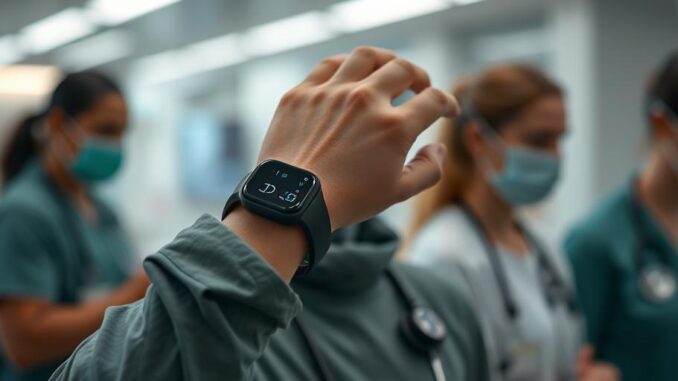
Summary
Wearable technology is revolutionizing healthcare with real-time monitoring, personalized insights, and remote patient care. From smartwatches tracking vital signs to AI-powered diagnostics, these devices empower individuals and transform how we manage health. This article explores the latest advancements in wearable tech, highlighting its benefits, challenges, and potential to shape the future of healthcare.
TrueNAS: the healthcare storage solution thats secure, scalable, and surprisingly affordable.
** Main Story**
Okay, so wearable tech? It’s kind of a big deal right now, totally changing how we look at healthcare. We’re talking smartwatches that keep tabs on your heart, patches that track chronic stuff – it’s like having a mini doctor on your wrist. I mean, who wouldn’t want that kind of control over their health? This is why I think we should dive into what’s happening now, where it could go, and yeah, the hiccups we need to sort out.
Wearable Devices: A Healthcare Revolution
Wearable technology? Basically, it’s any gadget you wear that grabs your personal data. Think smartwatches, fitness trackers – even those super advanced medical thingies. They’re all changing how we handle our health. I saw my old gym buddy the other day and he was wearing what looked like an Apple watch, and he was telling me it could pick up Afib and he would be able to take that data to a doctor. Crazy stuff really.
Fitness trackers push us to be healthier by tracking our steps and sleep. And some smartwatches, you know, the ones the FDA has given the thumbs-up to, they can spot heart issues. Plus, you’ve got those medical-grade wearables doctors use. They keep an eye on your vitals all the time, so problems can be caught early. It’s all about getting info in real-time. Patients and doctors both get the data they need to make smart choices about staying healthy.
Empowering Patients and Providers
Wearable tech gives both patients and doctors some serious advantages. For patients, they get to know themselves better and take charge of their health. They can see how much they’re moving, how well they’re sleeping, and what their vitals are doing, so they can make better choices every day.
Plus, these gadgets let doctors keep an eye on patients remotely. This is great for people with ongoing conditions like diabetes or high blood pressure. They don’t have to keep rushing to the hospital. You know, my uncle has diabetes, and this kind of tech would have made his life so much easier. Imagine not having to go in all the time just for a check-up. I feel like this remote monitoring really could be a huge change for people in his situation.
And for doctors? They get a ton of data that helps them diagnose and treat patients better. They can catch issues early and jump in when they need to. They can also tweak treatments and meds based on real-time data. It’s like, you get a much clearer picture, which means better results and a more efficient healthcare system. So, it’s a win-win, right?
Challenges and Future Directions
But, it’s not all sunshine and rainbows. There are challenges. One, how accurate is the data? You want to make sure these gadgets are giving you the right numbers, or else, you know, you’re making decisions based on bad info. Two, how do you keep all that data safe? It’s sensitive stuff, and we can’t afford any leaks. I mean, who wants their health info out there for everyone to see?
Also, wearables generate a ton of data. Doctors need good tools to make sense of it all. We’re talking about algorithms and AI that can crunch the numbers and give doctors the insights they need. What if we had AI that could predict health issues before they even happen? Think of the possibilities!
Looking ahead, there’s crazy potential. I saw some researchers looking at smart contact lenses that check your glucose, and clothes that track your vitals. Seriously. And as AI gets better, wearables will get even smarter. Healthcare is going to be more personalized and predictive than ever before. The future is wild.
In the end, wearable tech is going to play a big role in healthcare, giving people more power and changing the relationship between patients and doctors. I’m not saying it’s perfect, and there’s work to be done, but I think it’s heading in the right direction. I’m keen to see where this goes, aren’t you?


The potential for AI to predict health issues using wearable data is fascinating. How might we address the ethical concerns surrounding predictive diagnostics, particularly regarding privacy and potential biases in algorithms?
That’s a crucial point! Addressing the ethical considerations is paramount. Exploring anonymization techniques and developing robust validation methods to identify and mitigate algorithmic biases are essential steps. What other safeguards do you think might be effective in protecting patient privacy?
Editor: MedTechNews.Uk
Thank you to our Sponsor Esdebe
The potential for AI to analyze wearable data and predict health issues is exciting. Ensuring data accuracy and validity across diverse populations will be crucial to avoid disparities in healthcare outcomes. How can we proactively address potential biases in the design and validation of these AI algorithms?
That’s such an important point about data accuracy across diverse populations! Proactively addressing potential biases in AI algorithms is key. Perhaps incorporating diverse datasets during the algorithm training phase and establishing ongoing monitoring for bias detection could be beneficial. What strategies might be most effective during the initial design phase to ensure fairness?
Editor: MedTechNews.Uk
Thank you to our Sponsor Esdebe